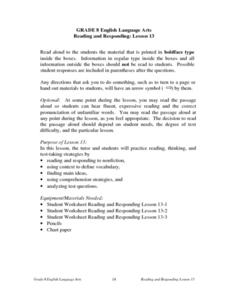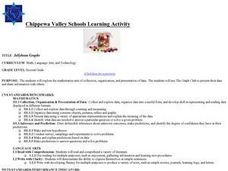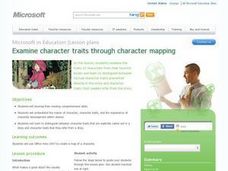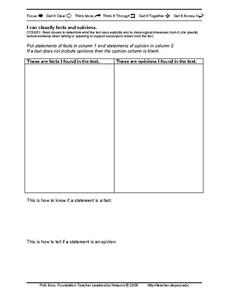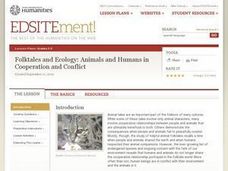Curated OER
Making Inferences and Drawing Conclusions
Second graders make several inferences based on the reading of Shel Silverstein poems. They write their own poetry and complete an assessment in which they differentiate between sentences that are stated or inferred.
Curated OER
Asha's Village
Students compare and contrast their own culture with an Indian girl named Asha. In this culture lesson plan, students read, look at pictures, and make inferences.
Pennsylvania Department of Education
Analyzing Key Ideas and Details in Nonfiction
Students explore nonfiction texts. In this language arts lesson, students read a nonfiction text and make predictions. Students identify facts and opinions in the text and draw conclusions as they read.
Curated OER
The Fear Place
Students use the strategy turn and talk to discuss inferences they have while reading the book The Fear Place. In this inferences lesson plan, students answer discussion questions and read independently as well.
Curated OER
Sunny or Shady?
Students practice answering questions to aid in creating meaning when reading. Through guided practice, they read a passage from the chapter book "Tuck Everlasting" and answer in-text and inference questions. Independently, they read...
Curated OER
Reading and Responding -- Lesson 13
Fourth graders work independently or in a small group to (1) read a fictional passage, (2) use context to define unfamiliar vocabulary, (3) use comprehension strategies, and (4) make inferences. Reading passage and teacher script is...
Curated OER
Jellybean Graphs
Second graders predict and graph data based on the color of jelly beans they think are in a handful. In this prediction lesson plan, 2nd graders will predict how many of each color jellybean are in a handful. Then they graph these...
Curated OER
African Folktales Lesson
Students explore what a folktale consists of as it relates to oral tradition. In this folktale lesson, students are told the African folktale, Why the Sun is Lives in the Sky and make personal inferences about what the folktale is...
Curated OER
Colored Drops
Students examine the properties of a liquid that contains water and food coloring and a liquid that contains water, food coloring and a liquid detergent. They interpret their data, describe properties, and make reasonable explanations...
Curated OER
Look Around You
Pupils make predictions about a book they are reading and use their background knowledge to make inferences. In this predictions lesson plan, students complete a worksheet that they are given.
Curated OER
Measuring Snowfall
Students predict the amount of snowfall for the week and measure snowfall. In this measuring snowfall lesson, student use a precipitation gauge to measure the week's snowfall; and analyze the data to determine whether or not...
Curated OER
The Tell - Tale Heart
Students read The Tell Tale Heart and practice critical analysis while reflecting on its underlying meanings. In this reading lesson plan, students make predictions, monitor their own comprehension and adjust their reading accordingly....
Curated OER
Growing Seeds: Making Predictions
In this prediction worksheet, students read statements on the left side of a graphic organizer about seeds and growing conditions, then predict in the right side of the column how much they think the seed will grow under each condition.
Curated OER
Making Inferences
In this making inferences worksheet, students fill in a graphic organizer with quotes or pictures from a text and the inference made. Page is a blank template only.
Curated OER
Examining Character Traits through Character Mapping
Some of what we know about a character is directly stated. Some of what we know is inferred by events in the story. Character maps help primary learners recognize the difference. After modeling with a story your class has read, pupils...
Polk Bros Foundation
I Can Identify/Infer Motive
Why do people and characters act as they do? Require your class figure out the motivation of two people or characters they read about in a given text. In the short charts, pupils note down who, what they do, and why they do it. After...
Polk Bros Foundation
I Can Sequence Important Events
After reading any short informational or fictional text, ask your class to analyze the important events. They note down three important events on a short timeline, describing the events with either words or drawings. After this, pupils...
Polk Bros Foundation
I Can Classify Facts and Opinions
Telling fact from opinion can be tricky. Direct your class to practice their reading and comprehension skills by taking notes on the facts and opinions in a text. Pupils fill out a two-column chart and write down how they know a...
Curated OER
Folktales and Ecology: Animals and Humans in Cooperation and Conflict
Story elements such as conflict, character analysis, resolution, and moral are discussed and charted as elementary children read folktales involving animals. An element of science is also introduced as learners discover what a keystone...
Curated OER
Process Skills Review: Observation, Inference, and Predictions
A simple worksheet asks science learners to define five terms and identify five statements as predictions, observations, or inferences. This would be a supportive assignment when introducing elementary-levle scientist to inquiry practices.
Curated OER
Lesson Three: Strategies to Infer
Third graders make inferences with a text. In this inferring activity, 3rd graders read Town Mouse Country Mouse by Jan Brett and they discuss the differences between city and country life. They make inferences as they read on the...
Curated OER
The Milk Bottle Quiz
In this scientific statements worksheet, students identify statements as an observation, inference, question, prediction, or factual. This worksheet has 7 matching questions.
Curated OER
Annie's Gifts: comprehension skills
In this comprehension skills worksheet, students read the book Annie's Gifts and complete comprehension activities. Students complete 5 activities including problem/solution, setting, making predictions, making inferences, and drawing...
Curated OER
Event Graphic Organizer
In this event graphic organizer activity, students identify an event, record details, list prior knowledge, make inferences, and make a conclusion.
Other popular searches
- Making Inference in Math
- Teaching Making Inference
- Making Inference Handout
- Making Inference Using Art
- Making Inference Worksheet
- Inference and Prediction
- Making Inference Review Game
- Making Inference Lessons
- Lesson on Making Inference
- Making Inference Using Coin
- Making Inference: Reading
- Making Inference Seuss







